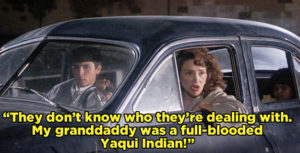
The film La Bamba tells the story of the rise to stardom and sudden death of Ritchie Valens. Film centers on how Ritchie comes from a working poor dysfunctional family. As the story unfolds we see many archetypes in the movie that aim to reflect the truth about Chicano families. Connie, is the female that had to take on macho characteristics in the absence of a husband. We see Bob as the macho who is also a drunkard and in trouble with the law. We see Rosie as the mother who is dominated by her husband. Ritchie is bashed for not conforming to Chicano norms of aggressive masculinity. In “Next of Kin” author Richard T. Rodriguez writes that while films like La Bamba appeal to the Chicano and Latino communities but that they are “governed by the necessity of ‘crossover’ appeal for a ‘broader audience’”. Is demonstrated as Richie is forced to change his name to Ritchie Valens in an attempt to sound more “professional” in my opinion it is an attempt to make his name sound less ethnic and therefore more palatable to the masses. Furthermore, these films continue to portray families that “evoke the stereotype that Chicano and Latino families are inherently ruled by patriarchy”. This is demonstrated though the relationship between Bob and Rosie, Bob is the strong macho and Rosie is the submissive mother. I also argue that filmmakers have to appease the executives in charge of production by reinforcing the stereotypes, on this Rodriguez writes “as African American filmmaker Spike Lee puts it, ‘the gatekeepers-these are the people that decide what goes on television, what movies are made, what gets heard on the radio, what’s getting written in the magazines- I can tell you those are all exclusively white males’”. When that is taken into consideration I am not surprised that the film portrays Bob as an abusive alcoholic who is in trouble with the law. I am not surprised that Connie is the typical femme macho who plays both mom and dad for the boys and simultaneously keeps her femininity. I am not surprised that Rosie is the Chicana mother who does not need to be liberated and will raise another generation of Chicanos who will be considered dysfunctional. It is also important to note that the family portrayed in La Bamba is also symbolic of the “sacred institution in which gender roles are fixed in the name of tradition”. At the same time though the film reveals how Chicano films create “figurations of la familia that simultaneously ‘shoot back’ at the stereotypical portrayals”. In that sense we see that Ritchie is naturally talented and manages to rise to fame. We also see that Bob is capable of rehabilitation, we see Bob flourish and become successful in his own means. We too see Rosie gather the strength to stand up to Bob. My favorite part is where Connie yells out at the club manager who refused to let Ritchie play “They don’t know who they’re dealing with. My granddaddy was a full-blooded Yaqui Indian!” which is in my mind a perfect example of how Chicano films aim “to rescue the past from oblivion, to raise the historical sense, to instill a sense of longing for the whole Mexican heritage”.
